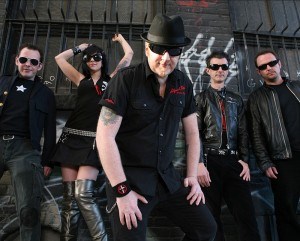
If you think a little whiplash from too much head banging is going to stop The Mahones, think again.
In fact, according to lead singer Finny McConnell, pretty much the whole band is busted up from some on-stage injury.
Sure, he says, after 23 years they can’t quite party like they used to, but give them a few shots of whisky and throw them on stage and they put on a wicked show every time.
“We’re still the fastest, craziest punk band out there,” McConnell says, “we’re not worried about our punk cred.”
On the phone the morning after their latest show in Regina, McConnell explains the band has been on tour pretty much non-stop since their eighth album, Angels and Demons, came out last year. Right now they are in the middle of a set of Western Canadian shows.
Over the past couple of years McConnell feels the band has really taken off. Their Facebook page has exploded and the new album is doing fantastically. He says he’s constantly getting phone calls from venues looking to book the band.
“Things are getting bigger and bigger all the time,” he says.
And he’s not exaggerating. What started as a one-off group thrown together for a St. Paddy’s Day gig in 1990 grew with blistering intensity to become a force in the punk scene.
Today, people talk about how The Mahones pioneered Irish punk.
It’s remarkable, really, considering that for a long time McConnell hated Irish music.
Born in Ireland, he came to Canada with his parents when he was a kid. His dad owned a chain of Irish bars in Ontario, and would often bring in Irish acts to perform; McConnell hated them all.
But that all changed when he was introduced to The Pogues. With their fiendish distortions of Irish classics, the band spoke to the punk child raging within McConnell.
“Woah, you can play those songs fast,” he remembers thinking to himself the first time he heard the Celtic punk icons.
McConnell took his new appreciation for Irish music and forged it into The Mahones. But, he says, it’s never easy “to get in there first.”
The Mahones had a rabid following in certain circles, but they had a tough time cracking larger venues.
McConnell explains that, as they were rising, acts like Ashley MacIsaac and Great Big Sea were riding the Celtic music wave. The Mahones, he explains, couldn’t land gigs because their songs were too raunchy.
Then, bands the Mahones paved the way for, like Dropkick Murphys, blew up, vaulting Irish punk into the public consciousness.
Finally, however, McConnell feels like The Mahones are getting their due. They’ve played in more than 50 countries and next year they plan to be the first Irish punk band to release a double album.
“It’s really nice to face the success of your life’s work and see it pay off around the world,” he says.
Trevor Nichols
[email protected]
